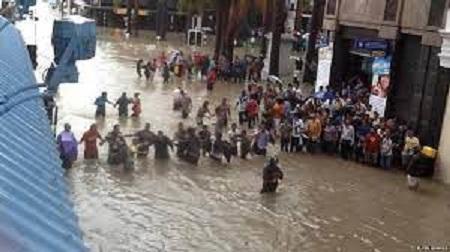Africa-Press – Mauritius. In the absence of all the relevant facts, the situation remains murky, leaving questions lingering about the potential scapegoating of Ram Dhurmea, a highly qualified meteorologist recently appointed as head of the Mauritius Meteorological Services (Met).
This marks the second instance of a director of the Met being removed under almost identical circumstances related to flooding following torrential rain.
The echoes of a similar event from eleven years ago, where a judicial inquiry instituted by the former DPP, Satyajit Boolell, scrutinized the circumstances surrounding the flooding in 2013, add a layer of historical context to the current dilemma.
Back in 2013, the then deputy director of the Met, Rajan Mungra, the then deputy director of the Met, acknowledged the absence of established procedures for flash floods, which resulted in a tragic loss of lives in the Capital. Fast forward to the recent events on January 15, 2024, and it appears that the lessons from the past have not been heeded.
Ram Dhurmea has submitted his defence, but a video recording from the Third National Crisis Committee meeting, chaired by Hon Husnoo, the minister responsible for Local Government and Disaster Risk Management, and broadcast on MBC-TV, refutes his explanations.
While the debate between Ram Dhurmea and Hon Husnoo unfolds, the underlying issue remains: Port Louis continues to grapple with recurrent and life-threatening floods despite the billions earmarked in the Budget for addressing this issue.
Beyond being an inconvenience, these floods have caused substantial damage to both public and private infrastructure, with the recent loss of a citizen in Pailles –presumed to be due to the January 15 flooding, though officially ascribed to a road accident — further amplifying the urgency of the matter.
In the aftermath of this tragic incident, there is a growing consensus among citizens, advocacy groups, and stakeholders for the immediate need to conduct a comprehensive judicial inquiry akin to the one instituted in 2013.
Such an inquiry is deemed essential to unravel the root causes, assess the adequacy of existing preventative measures, and formulate effective strategies for flood prevention.
The recurrent floods in Port Louis are not merely a consequence of natural disasters; they reflect inadequate infrastructure planning and management. Ministerial responsibility encompasses a wide spectrum of duties, from immediate crisis response to long-term planning.
This includes the development and maintenance of robust infrastructure, drainage systems, and urban planning that considers potential flood risks. Deaths resulting from flooding in Port Louis underscore the urgency for concrete actions.
The Mauritian community rightfully demands answers regarding the effectiveness of current preventative measures and the government’s commitment to ensuring citizen safety. A judicial inquiry emerges as a crucial platform for a thorough examination of the root causes of recurrent floods.
It can delve into issues such as the adequacy of drainage systems, the impact of urban development on flood-prone areas, and the overall preparedness of authorities to handle such emergencies.
By examining past incidents and current protocols, the inquiry could offer valuable insights into gaps and weaknesses in the system that need urgent attention.
For More News And Analysis About Mauritius Follow Africa-Press







